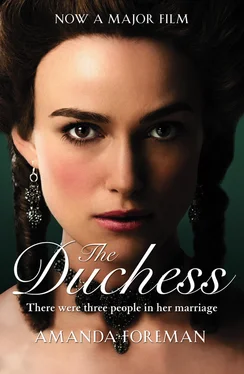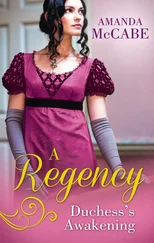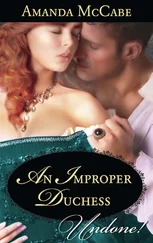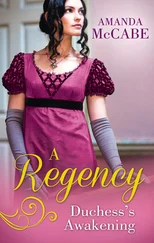Those who embraced the Circle maintained a lofty disdain for the world outside. * Serious Devonshire House acolytes identified themselves by their imitation of the Cavendish drawl. By now Georgiana never spoke in any other way and the more it became one of her personal mannerisms, the more compelling it was to her admirers. What began as playful mimicry evolved with popular usage into a kind of dialect, called the ‘Devonshire House Drawl’. It has been characterized as part baby-talk, part refined affectation: hope was written and pronounced as ‘whop’; you became ‘oo’. Vowels were compressed and extended so that cucumber became ‘cowcumber’, yellow ‘yaller’, gold ‘goold’, and spoil rhymed with mile. Stresses fell on unexpected syllables, such as bal-cony instead of bal- cony and con- tem plate. 4 By the middle of the next century all Whigs would speak in the Drawl, transforming a family tradition into a symbol of political allegiance, but in Georgiana’s time it remained the Circle’s own patois. Lord Pelham was moved to warn a friend: ‘I hope you will love the Dss and forgive some of her peculiarities – but above all do not adopt their manners … I have never known anybody that has lived much with them without catching something of their manner.’ 5
At its broadest the Circle numbered more than a hundred people; at its most intimate, thirty. In modern terms they were London’s ‘café society’: the racier members of the aristocracy mixed with professional artists and actors, scroungers, libertines and wits. The playwright and arch-scrounger Richard Brinsley Sheridan was one of its stars. An incorrigible drinker, womanizer and plotter, he embodied the best and worst of the Circle. He was brilliant yet lazy, kind-hearted and yet remiss over honouring his debts to the point of dishonesty. Sheridan disliked paying his creditors on the grounds that ‘paying only encourages them’. He once shook his head at the sight of a friend settling his account, saying, ‘What a waste …’ 6 He was introduced to Georgiana through his wife, the beautiful and talented singer Elizabeth Linley. Then at the pinnacle of her career, Elizabeth consented to perform at Devonshire House so long as she could be accompanied by her husband. Sheridan’s sole success at the time, The Rivals , did not gain him an invitation on his own account. Notwithstanding his inauspicious introduction as Elizabeth’s escort, Sheridan worked feverishly to ingratiate himself into the Circle. He made it his business to be entertaining, to be useful, to know every secret and to have a hand in every intrigue. Having secured his place, he encouraged his wife to relinquish her career and only the very fortunate heard her sing again. *
David Garrick was another celebrated theatrical member of the Circle. After watching him give a pre-supper performance, Georgiana wrote: ‘I have no terms to express the horror of Mr Garrick’s reading Macbeth. I have not recovered yet, it is the finest and most dreadful thing I ever saw or heard, for his action and countenance is as expressive and terrible as his voice. It froze my blood as I heard him …’ 7 Second to Garrick in celebrity was the sculptress Mrs Damer, whose heads of Father Thames and the goddess Isis still adorn Henley Bridge. Rumour hinted that she had lesbian tendencies although there was a more obvious explanation for the failure of her marriage: the Hon. John Damer was a pathetic drunk and gamester. In August 1775 he shot himself through the head in a room above the Bedford Arms at Covent Garden after having ruined them both in a single night.
The Craufurd brothers – the francophile James, known as ‘Fish’ because he could be extraordinarily selfish, and Quentin, known as ‘Flesh’ – were renowned connoisseurs of art whose presence lent an intellectual quality to Devonshire House suppers. Their conversational skill was matched by the famous wit James Hare, Georgiana’s particular favourite. ‘He has a manner of placing every object in so new a light,’ she explained to her mother, ‘that his kind of wit always surprises as much as it pleases.’ * 8 Hare was also discreet and trustworthy – rare attributes, Georgiana discovered, in the Devonshire House world. Even the ‘mere’ politicians of the Circle were celebrated for their other achievements, like the playwright and satirist General Richard Fitzpatrick, who wrote the enormously successful Rolliad. Georgiana also felt a special affection for the Whig politician and bibliophile Thomas Grenville, who reputedly never married because of his hopeless love for her. These conquerors of the drawing room were joined by such sportsmen as the Duke of Dorset who, when he was not making a reputation for himself as the debaucher of other men’s wives, transformed cricket into the national game. The Earl of Derby, whose wife was one of Dorset’s conquests, and Lord Clermont promoted British horse racing with the establishment of the Oaks and the Derby.
The women, who were no less extraordinary, divided into those who were received by polite society and those who were not. The socially proscribed women included Georgiana’s cousin Lady Diana Spencer, who had committed adultery with Topham Beauclerk in order to provoke her violent husband Lord Bolingbroke into divorcing her. Although an outcast in society, Lady Diana enjoyed equal status at Devonshire House with the ‘beauties’ and celebrated hostesses. Among these were Lady Clermont, a great favourite at Versailles, Lady Derby, who had once hoped to marry the Duke of Devonshire, and Lady Jersey, who used her ‘irresistible seduction and fascination’ to wreck the marriages of her friends. According to a contemporary, she was ‘clever, unprincipled, but beautiful and fascinating’. 9 Mrs Bouverie, whom Reynolds painted to much acclaim, and the conversationalist Mrs Crewe completed the inner group of respectable women. They were highly competitive and spent much of their time putting one another down. Although greatly respected by her politician friends, and a confidante of Edmund Burke, Mrs Crewe was dismissed by Lady Douglas as ‘very fat with a considerable quantity of visible down about her mouth … her ideas came so quick that [Lady Douglas] could not follow them, nor she believed Mrs Crewe herself’.
Lady Spencer had mixed feelings about the female members of the Circle, but she loathed one woman in particular: Lady Melbourne. Beautiful, clever and ruthless, Lady Melbourne epitomized the decadence of Georgiana’s friends. The incurable gossip Lord Glenbervie recorded in his diary, ‘it was a very general report and belief that … Lord Coleraine sold Lady Melbourne to Lord Egremont for £13,000, that both Lady and Lord Melbourne were parties to this contract and had each a share of the money.’ 10 The story might even have been true. Lord Melbourne was an enigma, a silent figure in the drawing room whom visitors to Melbourne House barely noticed. Once Lady Melbourne had presented him with an heir he allowed her the freedom to do and see whom she pleased. He also profited by it. She was not a woman to give her affections indiscriminately. Through her efforts Lord Melbourne was made a viscount in 1781, and later a Gentleman of the Bedchamber in the Prince of Wales’s household. Two of her five children were the offspring of Lord Egremont; another, George, the result of her affair with the Prince of Wales. Only the eldest and possibly the youngest were Lord Melbourne’s.
Before Georgiana’s entry into the ton Lady Melbourne had reigned as its leading hostess. People naturally assumed that they would become rivals, but Lady Melbourne had no intention of setting herself up in opposition to Georgiana. She befriended her and adopted the role of benign older counsel instead. ‘My dearest Thémire’ (the French term for Themis, the Goddess of Justice) was how Georgiana usually addressed her. Lady Melbourne was a natural manager of people. She had a firm grasp of the recondite laws which governed life within the ton , and an unsentimental, even cynical view of humanity. ‘Never trust a man with another’s secret,’ she is reputed to have said, ‘never trust a woman with her own.’ Ferociously practical and discreet, she could also be sarcastic and cutting when irritated. Georgiana was in awe of her temper; ‘I believe I have been a little afraid of you,’ she once admitted. 11 ‘Pray write to me, tell me that you love me and are not angry with me,’ she pleaded on another occasion. 12
Читать дальше












